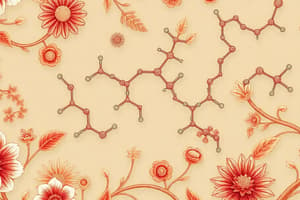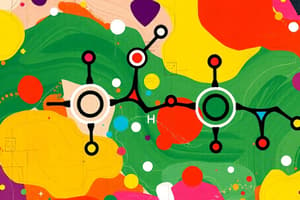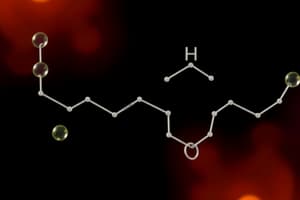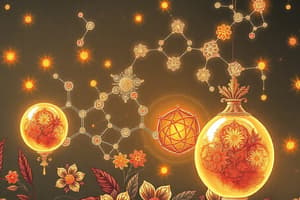Podcast
Questions and Answers
What distinguishes primary, secondary, and tertiary alcohols?
What distinguishes primary, secondary, and tertiary alcohols?
- The presence of additional functional groups
- The number of carbon atoms bonded to the carbon with the -OH group (correct)
- The number of hydrogen atoms on the hydroxyl carbon
- The number of -OH groups present
Which functional group characterizes carboxylic acids?
Which functional group characterizes carboxylic acids?
- Hydroxyl group
- Alkyl group
- Amino group
- Carbonyl plus hydroxyl group (correct)
Which statement correctly describes amines?
Which statement correctly describes amines?
- They cannot contain multiple carbon groups
- They contain only one nitrogen atom
- They are classified based on the number of oxygen atoms
- They replace hydrogens in ammonia with carbon groups (correct)
What is the structural representation of a carbonyl group?
What is the structural representation of a carbonyl group?
How is a carboxylic ester formed?
How is a carboxylic ester formed?
Flashcards are hidden until you start studying
Study Notes
Alcohols
- Contain an -OH (hydroxyl) group bonded to a tetrahedral carbon atom.
- Classified as primary (1°), secondary (2°), and tertiary (3°) based on the number of carbon atoms bonded to the carbon bearing the -OH group.
Aldehydes
- Contain a carbonyl group (C=O) bonded to a hydrogen; a -CHO group.
Amides
- Functional derivatives of carboxylic acids where an amino group replaces the -OH of the carboxyl group.
Amines
- Organic compounds with one, two, or three hydrogens in ammonia replaced by carbon groups (RNH2, R2NH, or R3N).
- Classified as primary (1º), secondary (2º), and tertiary (3º) based on the number of carbon groups bonded to the nitrogen atom.
Amino Group
- A nitrogen atom bonded to one, two, or three R groups (RNH2, R2NH, or R3N) where R represents a carbon group.
Carbonyl Group
- A C=O group.
Carboxyl Group
- A combination of carbonyl and hydroxyl groups: a -COOH group.
Carboxylic Acids
- Compounds containing a -COOH group.
Carboxylic Esters
- Derivatives of carboxylic acids where a carbon group replaces the H of the carboxyl group; -COOR or -CO₂R.
Condensed Structural Formula
- A shorthand method for writing organic structures grouping hydrogens with the atom they're attached to.
Functional Group
- The group of atoms that defines a compound's identity.
- It causes predictable physical and chemical behaviors within a molecule.
Hydroxyl Group
- An -OH group bonded to a tetrahedral carbon atom.
Ketones
- Compounds containing a carbonyl group (C=O) bonded to two carbon groups.
Organic Chemistry
- The study of carbon compounds.
Studying That Suits You
Use AI to generate personalized quizzes and flashcards to suit your learning preferences.




